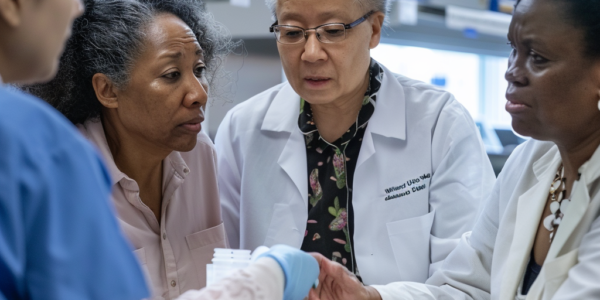Washington University School of Medicine Joins National Clinical Trials Network for Cancer Screening
Washington University School of Medicine in St. Louis has joined a new national clinical trials network launched by the National Cancer Institute (NCI) to investigate emerging technologies for cancer screening. The goal of the network is to reduce cancer-related illnesses and deaths, with a key priority being the inclusion of participants from diverse populations. Collaborating with Siteman Cancer Center, the investigators will lead trials in Missouri and parts of Illinois, aiming to reach diverse populations, including those living in underserved areas. The network’s primary focus is to evaluate the effectiveness of a screening technology designed to detect multiple cancers with a single blood test, with the researchers aiming to determine whether such tests can detect cancer early and ultimately save lives.
Promising Results Unveiled from Immunic’s Phase 2 Clinical Trials for Multiple Sclerosis Therapy
Immunic, Inc. (NASDAQ:IMUX) unveils promising results from phase 2 clinical trials at the ACTRIMS Forum 2024, showing potential for vidofludimus calcium as a therapy for progressive multiple sclerosis and its impact on fatigue possibly linked to Epstein-Barr virus reactivation. The interim analysis revealed a substantial reduction in serum neurofilament light chain levels in PMS patients treated with vidofludimus calcium, indicating potential neuroprotective benefits. The drug also showed promise in preventing EBV reactivation and alleviating fatigue in MS patients. These groundbreaking results mark a significant stride in Immunic’s clinical pipeline.
Rheumatoid Arthritis Drug Abatacept May Also Prevent the Disease
Rheumatoid arthritis drug abatacept, already used to treat the disease, may also prevent its onset, new research shows. Clinical trial results published in The Lancet indicate that abatacept eases symptoms and prevents joint damage, offering hope to the 1.3 million Americans living with the painful inflammatory disease.
University of Auckland researchers testing castor oil as potential treatment for dry-eye disease
University of Auckland researchers are testing the application of castor oil to treat dry-eye disease with promising results so far. The trial of castor oil as a potential safe and natural treatment for dry-eye disease is being conducted following a successful pilot study. With dry-eye disease affecting a significant portion of the population, the current trial aims to provide a long-term solution for patients grappling with uncomfortable symptoms. The use of cold-pressed castor oil in a unique application on the eyelids has shown measurable improvements in symptoms, leading to a more extensive study to generate robust scientific evidence for clinicians.
Gilead stock falls 10% after disappointing lung cancer drug trial results
Shares of Gilead took a hit as the stock fell more than 10% on Monday following disappointing results from a late-stage trial of its key lung cancer drug, Trodelvy. The trial failed to significantly extend the lives of patients with…





